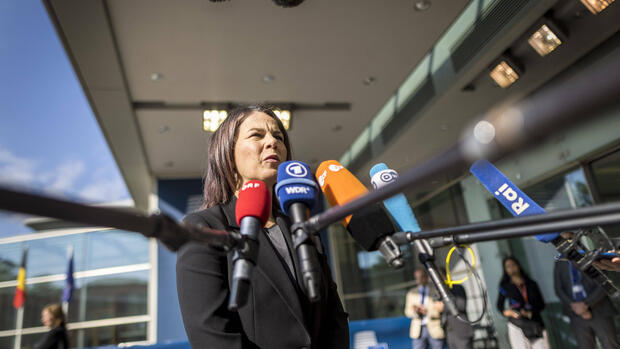The German Foreign Minister said the EU will continue to monitor the situation in Russia closely.
(Photo: IMAGO/photothek)
Brussels The European Union (EU) is reluctant to assess the Wagner mercenaries’ attempted uprising against Russian President Vladimir Putin. At their meeting in Luxembourg on Monday, several EU foreign ministers stressed that it was still too early to draw any conclusions and that the situation must continue to be closely monitored.
“We don’t interfere,” said German Foreign Minister Annalena Baerbock (Greens). “It is still unclear what is happening there.”
However, Baerbock apparently assumes that the power struggle in Russia is not over yet. The events of the weekend are “just one act in this Russian drama,” she said. However, it is already clear that the Russian war of aggression will hit the country. “We see massive cracks in Russian propaganda.”
Baerbock emphasized that it was not yet possible to assess the risks that would arise from this for Ukraine and Europe. The EU can only continue to support Ukraine. That is why the European Union is increasing the EU peace fund by 3.5 billion euros. The federal government will also send 45 more Gepard tanks to Ukraine by the end of the year.
Luxembourg’s Foreign Minister Jean Asselborn warned of a “major destabilization” in Russia. “It would be dangerous for Europe if the largest country in the world with the most nuclear weapons in Europe crumbled,” he said. Putin has lost his “omnipotence”. This could have negative consequences for Ukraine. The war in Ukraine is Putin’s only raison d’être, and it could now happen that he wages the war even more brutally, said the Luxemburger.
Danish Foreign Minister Lars Lökke Rasmussen said the weekend’s events could change the course of the war. But whether they are a “game changer” he does not know. At least Putin is weakened. The representatives of the Baltic countries appealed to their colleagues to now increase support for Ukraine and other neighbors of Russia. “We must keep the pressure on Russia and win the war,” said Estonian Foreign Minister Margus Tsahkna.
Lithuania: The Russians manage the regime change alone
His Lithuanian colleague Gabrielius Landsbergis called for more European troops to be stationed in his country. At the weekend we saw how quickly Russian troops could get to Moscow, he said. They could advance just as quickly through Belarus to the EU borders. Russia is unpredictable, as the events of the weekend showed. Federal Defense Minister Boris Pistorius (SPD) declared on Monday that he was willing to permanently station a brigade with 4,000 soldiers from the Bundeswehr in Lithuania.
The Baltic states are in favor of securing NATO’s eastern flank.
(Photo: IMAGO/photothek)
Landsbergis expects further rebellions in Russia. The Wagner uprising underscores that there are doubts in Russia about the war against Ukraine. “History shows that whenever Russia is overstretched in a foreign war, there is trouble in Russia,” he said.
For Landsbergis, the most important lesson of the mutiny is that regime change in Moscow does not have to be initiated from outside. “The Russians can do it themselves.” Both Baltic ministers spoke out in favor of confiscating the frozen reserves of the Russian central bank and using them to rebuild Ukraine. Tsahkna announced that Estonia would present a legally clean proposal. The EU could use this as a guide.
>> Read here: For Putin, the problems are just beginning
The EU Commission intends to present a corresponding draft law before the summer break. However, access to the Russian reserves is highly controversial among the member states. While Poland and the Baltic countries are in favour, most others warn against breaking the law.
In principle, one is in favor of helping Ukraine as much as possible, said Dutch Foreign Minister Wopke Hoekstra. However, there is a clear limit: “We will never break the law.” The federal government sees it similarly, even if Baerbock did not comment on Monday. The topic is to be discussed at the EU summit of heads of government on Thursday.
More: ECB warns EU against accessing Russian state assets
